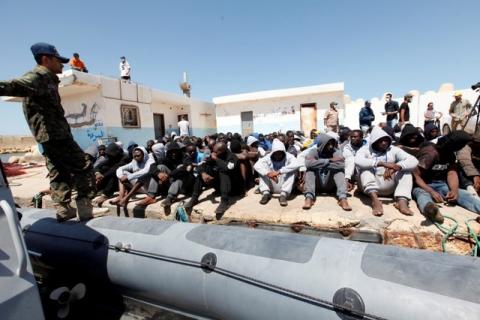Advertisement
EU ministers turn wary eye on migration from North Africa
BRUSSELS (Reuters) - European Union ministers will look on Friday into ways of stemming the flow of migrants who set sail for Europe from Libya and elsewhere in north Africa after a deal with Turkey has cut arrivals via Greece to a trickle.
The EU fears the central Mediterranean route to Italy may become the main one now as calmer seas encourage more people to try the perilous journey.
"The EU-Turkey deal is functioning and so, if nothing changes, the central Mediterranean will this year be the route through which the bulk of migrants will be coming," said an EU diplomat. He said some 45,000 people had reached Italy that way this year, roughly at the same level as last year.
The EU is also worried about the long-term impact of massive migration from Africa. It is considering linking development aid and trade ties with poor states to them keeping a lid on migration.
EU interior ministers meeting in Luxembourg on Friday will also discuss Libya, where a U.N.-backed government is trying to establish itself, while people smugglers operate freely.
The meeting takes place as EU member Britain readies itself for a June 23 referendum on membership of the 28-nation bloc in which migration is a key issue.
The ministers were also due to approve tougher rules for acquiring and holding guns in the EU, a plan first introduced after Islamist attacks in Paris killed 130 people last November.
But some diplomats said the original proposal was so diluted as to be almost irrelevant after countries including Finland, the Czech Republic and Estonia pushed back, saying their hunters, sports people, collectors, museums or national militias must be allowed to hold weapons.
GEORGIA LINKED TO UKRAINE?
The ministers were not due to agree on visa liberalization for Georgia, which just a few ago weeks seemed on track to secure the privilege this summer.
Germany - joined by France and Italy - led the 11th-hour opposition, saying a growing number of crimes committed in Germany were attributable to Georgians.
Germany took in most of the 1.3 million refugees and migrants that reached Europe last year, an influx that triggered a spike in anti-migration sentiment across the continent, fuelling support for nationalists, populists and eurosceptics.
But diplomats in Brussels said Berlin might be stalling Georgia not to put in a delicate spot the pro-Western authorities in Ukraine, another country hopeful to win easier access to Europe's free-travel Schengen zone of 26 states.
In turn, they said, Germany wants Kiev to make progress in implementing the February 2015 Minsk peace agreements for eastern Ukraine where sporadic fighting between Russia-backed rebels and government troops is still occurring despite the peace plan.
Ukraine and Russia trade blame for failing to deliver on the peace plan and the EU has linked lifting sanctions on Russia over the conflict in Ukraine to the plan being fully implemented.
Berlin may also be weighing the issue of Turkey, which does not meet visa-liberalization criteria but has named relaxed travel rules with Europe as its price for curbing the flow of migrants.
(Additional reporting by Tom Koerkemeier, Writing by Gabriela Baczynska; Editing by Richard Balmforth)



















Add new comment